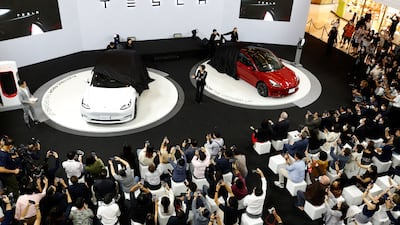Tesla, the world's biggest electric vehicle manufacturer, set another record for annual deliveries as it shipped 1.31 million cars in 2022, up more than 40 per cent year on year.
The jump in deliveries was buoyed by a record fourth quarter, despite production challenges and concerns about weakening demand.
Deliveries for the three-month period ended December 31, 2022 were up by about a third to 405,278, from 308,600 a year earlier, and about 18 per cent higher from 180,570 in the third quarter, the Texas-based company said on Monday.
However, Tesla's deliveries missed Wall Street estimates and even the company's own growth projection of 50 per cent, despite opening two new factories last year.
Fourth-quarter deliveries were also short of the Bloomberg estimate of about 420,760 vehicles.
The company was close to matching its full-year performance in 2021 through the third quarter as it delivered 908,573 vehicles in the first nine months of 2022, compared to 936,172 in all of last year.
In 2021, Tesla was able to beat its 2020 annual delivery numbers in the third quarter.
Total production in the fourth quarter of 2022 grew by about 44 per cent to 439,701, from 305,840, bringing 2022's full-year total to 1.37 million, up by about 48 per cent from 930,422 a year earlier, the company said.
The “great 2022" was achieved despite “significant Covid and supply chain-related challenges throughout the year”, Tesla said.
“We continued to transition towards a more even regional mix of vehicle builds which again led to a further increase in cars in transit at the end of the quarter,” the electric vehicle maker said.
The company is scheduled to report its full-year financial results on January 25.
Tesla's performance is widely viewed as a barometer of the EV market as more consumers opt for environmentally friendly alternatives to traditional internal combustion vehicles.
However, the company failure to achieve its growth targets could spark more investor concern, given that chief executive Elon Musk had projected an “epic” end to 2022.
The company is already struggling with still-high inflation, high interest rates, supply chain issues and other economic headwinds.
After Mr Musk's declaration, Tesla went on to introduce aggressive moves in two of its key markets: it slashed prices and production in China, and offered $7,500 in discounts to customers in the US.
The news in early December about Tesla planning to suspend output at its factory in Shanghai caused a massive sell-off in the company, sending its stock down 37 per cent at the time and dragging its valuation below the $500 billion mark. The company's shares eventually ended down 69 per cent for all of 2022.
Its market capitalisation continued to decline since then. As of Tuesday, it stood at about $389 billion.
Tesla shares did not trade on Monday due to a New Year holiday in the US. They were down about 3 per cent to $119.61 in pre-market trading on Tuesday.
Investors were also wary of Mr Musk's unorthodox and controversial actions at Twitter, which he bought for $44 billion last year.
Tesla is facing a "significant demand problem" that would persist in 2023, Toni Sacconaghi, an analyst at private wealth management firm Bernstein, wrote in a note following Tesla's report.
“Tesla will need to either reduce its growth targets [and run its factories below capacity], or sustain and potentially increase recent price cuts globally, pressuring margins,” he said.
"We see demand problems remaining until Tesla is able to introduce a lower priced offering in volume, which may only be in 2025."
Tesla's Model 3 and Model Y remained its top-selling vehicles, accounting for 388,131, or about 96 per cent, of total deliveries in the fourth quarter.
The two cars held a similar share in production in the three-month period, with 439,701 units.
For 2022, the vehicles also comprised 95 per cent of deliveries and production, with more than 1.24 million and 1.29 million units, respectively.
Compared with a year ago, fourth-quarter Model 3 and Model Y deliveries surged by more than three quarters and production was up by about 70 per cent.
On an annual basis, deliveries rose 73 per cent and production grew by almost 70 per cent.
Meanwhile, the Model S and Model X posted 17,147 deliveries in the fourth quarter, up 47 per cent annually, and 66,705 for all of 2022, a surge of 167 per cent from 2021.
Production stood at 20,613 in the three-month period and 71,177 for the entire year, increases of 57 per cent and 191 per cent, respectively.
Mr Musk is also aiming to boost the company's portfolio, having delivered the company's first heavy-duty Semi electric lorry to Pepsi early in December, making good on a pledge he made in October.
However, he did not offer any updated forecasts for the lorry's pricing or production plans.








